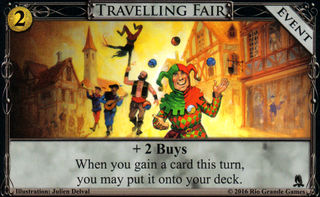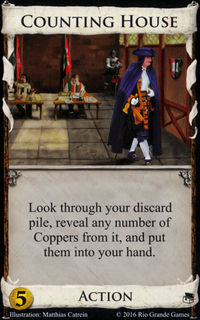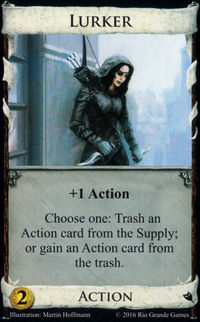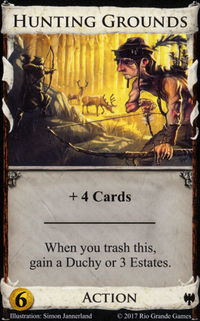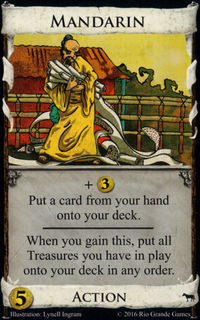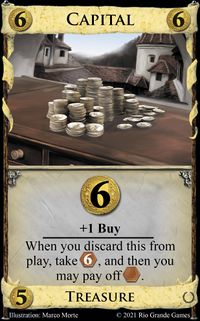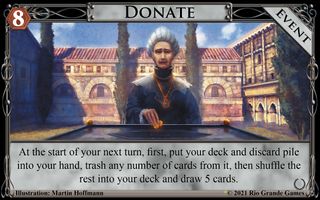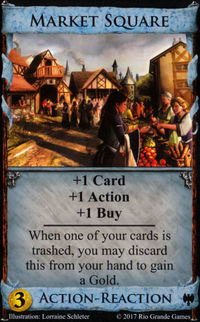|
|
| (17 intermediate revisions by 11 users not shown) |
| Line 1: |
Line 1: |
| − | ''See also: [[Counter]]''
| + | {{Improve}} |
| | | | |
| − | A '''combo''' can refer to two things:
| + | The term '''combo''' is sometimes used to refer to a cohesive strategy that relies ''only'' on two (sometimes three) cards, often to the point of being centralizing in a given [[Kingdom]]. While combos of 3 or more cards are possible, unless one of these is a base card in every game (or at least one of the cards needed is simply a card archetype, e.g. a [[Village (card category)|village]] or [[+Buy]]/[[gainer]]) rather than a specific card, it's unlikely that you will encounter all three of those cards in a real game. |
| | | | |
| − | # Two or more cards with a particular [[synergy]]
| + | The term "combo" has been used historically to refer to two cards which merely have [[synergy]] with each other without constituting a game-winning strategy by themselves, however, as more game-winning combos became available, this usage has fallen out of favor. |
| − | # A cohesive strategy that relies ''only'' on two (sometimes three) cards
| + | |
| − | | + | |
| − | The first can act as a supplement or centerpiece to a larger strategy, and is typically the broader category. But when talking about a combo ''deck'', it is the second that is being referred to.
| + | |
| − | | + | |
| − | In some combos, one card will make up for the other's weakness. In others, the two cards will play off each others' strengths. While combos of 3 or more cards are possible, unless one of these is a base card in every game (or at least one of the cards needed is simply a card ''class'', e.g. [[Village (card category)|village]] or [[+Buy]]/[[gainer]]) rather than a specific card, it's unlikely that you'll be able to find the combo in many games. Such combos really fall into the category of strategies rather than merely simple combos. As it is, depending on how many expansions you use, the odds can be as low as 1 in 616 that two specific cards will appear in a given kingdom. However, given that many players play 100's, if not 1000's of games, these odds are not too bad.
| + | |
| | | | |
| | == Strategy == | | == Strategy == |
| − | [[Image:Counting House.jpg|thumb|right|200px|[[Counting House]] is a card most often used in combos and slogs.]]
| |
| − | ''[http://dominionstrategy.com/2013/01/25/the-five-fundamental-deck-types-the-combo/ Original article] by WanderingWinder.''
| |
| − |
| |
| − | === What characterizes the Combo? ===
| |
| − | A combo deck is a one that revolves entirely around a particular specific combo of 2+ different cards, generally getting 5-20 copies of the required cards in total. Once the combo is in place, if this has happened quickly enough, the deck should basically just win. This archetype does not deal with cards that work well together – i.e. it’s not just decks that have combos in them, a la [[Combo: Horse Traders and Duke|Horse Traders-Duke]], which is a [[Slog]], or {{Card|Warehouse}}-{{Card|Treasure Map}}, which works together well but isn’t an entire deck, but rather deals with combos that are self-contained, the-entire-deck-and-gameplan-is-this strategies. Typically, these combos are fairly resistant to adding other cards in with them.
| |
| − |
| |
| − | Usually, with more than two distinct cards, you are really talking about an engine, which is a bunch of good cards that work well together and draw a lot, but this is not a hard-and-fast rule. Even things like {{Card|Hunting Party}} stacks and {{Card|Minion}} decks aren’t combos – they’re [[engine|engines]] – that’s just (strong) cards being used to cycle you through, which can sometimes be extremely powerful with few cards, but isn’t a combo – there needs to also be some particular synergy, a sum-is-greater-than-the-parts, but particularly in such a way that goes beyond the normal functionality of a card.
| |
| − |
| |
| − | For instance, something like {{Card|Worker's Village}} and {{Card|Rabble}} pair really nice together, as they give you Actions, [[Attack]], Buys, and draw – everything you need for an engine except money – but this is clearly not a combo, it is an engine, and part of how you can tell is that the parts are really modular – you might lose a little bit of efficiency by switching to another kind of Village or Smithy variant, but generally those roles can be filled by a number of other cards.
| |
| − |
| |
| − | Something like [[Combo: Native Village and Bridge|Native Village/Bridge]], on the other hand is very much a combo – it plays quite differently than other decks featuring these cards, and more important, you can’t get the same kind of functionality out of any other cards.
| |
| − |
| |
| − | Some examples of Combo Decks include (not an exhaustive list!):
| |
| − |
| |
| − | ==== The Native Village/Bridge deck ====
| |
| − | Buy nothing but {{Card|Native Village|Native Villages}} and {{Card|Bridge|Bridges}}. Use Native Village at every opportunity to put every card on the Native Village mat. When the time is right, empty your giant Native Village mat and mega-turn out with all your Bridges.
| |
| − | ==== [[Combo: Chancellor and Stash|The Chancellor(or Scavenger)/Stash deck]] ====
| |
| − | Buy 4 {{Card|Stash|Stashes}} and multiple {{Card|Chancellor|Chancellors}}. Every turn, play your Chancellor, put 4 Stashes on top of your deck, and get a Province. Repeat as soon as you draw another Chancellor. {{Card|Scavenger}} makes this even more powerful, since it allows you to guarantee putting a Scavenger in your hand every turn. Plus you only need 3 Stashes.
| |
| − | ==== The [[Golden deck]] ====
| |
| − | {{Card|Bishop}}/{{Card|Chapel}} into a 5 card deck of {{Card|Gold}}/Gold/{{Card|Silver}}/Bishop/{{Card|Province}} (or Gold/Silver/Silver/Bishop/Province). Bishop the Province, buy a Province. Earn 5{{VP}} every turn while rushing the game end.
| |
| − | ==== [[Combo: Counting House and Golem|The Counting House/Golem deck]] ====
| |
| − | Your deck is nothing but {{Card|Copper}}, {{Card|Golem|Golems}}, and exactly one {{Card|Counting House}}. Every Golem puts your whole deck in the discard and plays the Counting House, which draws all your Copper.
| |
| − |
| |
| − | ==== The Apothecary/Native Village deck ====
| |
| − | Have 8 Copper, 1 Native Village, and tons of {{Card|Apothecary|Apothecaries}}. Never use Native Village blindly; only use it to filter out green cards that your Apothecaries leave on top of the deck. Once you start humming and your Apothecaries draw {{Cost|8}} or {{Cost|11}}, your sole Native Village sucks up the new green card every turn, while your Apothecary leaves an Apothecary on top of the deck, essentially guaranteeing that it can keep going indefinitely.
| |
| − | ==== Various forms of the [[Masquerade pin|Deck Deletion Pin deck]] ====
| |
| − | The crux is that you use {{Card|Masquerade}} to "[[trash]]" your opponent’s deck into nothing. This combo has the nice property that since your opponent starts every turn with 0 cards and ends the game with 0 cards in his deck, you can usually take your time setting it up.
| |
| − | ==== {{Card|King's Court}}/King's Court/{{Card|Scheme}}/Scheme ====
| |
| − | Adding just about anything else guarantees {{Cost|8}} or {{Cost|11}} every turn thereafter.
| |
| − |
| |
| − | ==== [[Combo: Philosopher's Stone and Herbalist|Philosopher's Stone/Herbalist]] ====
| |
| − | With every buy you bloat your deck as much as possible. You buy nothing but Coppers, {{Card|Philosopher's Stone|Philosopher's Stones}}, and {{Card|Herbalist|Herbalists}}. You use the Herbalist to repeatedly buy, then play, the PStone.
| |
| − | ==== {{Card|Tactician}}/{{Card|Vault}} ====
| |
| − | Tactician gives you 10 cards. Vault draws you 2, to a total of 11, and you can discard up to 9 of them for {{Cost|9}}. The remaining two cards are a Tactician and something you discard to the Tactician to repeat this process.
| |
| − |
| |
| − | ==== [[Combo: Black Market and Tactician|Black Market/Tactician]] ====
| |
| − | Tactician gives you 10 cards. Black Market plays all your Treasures. Another Tactician discards your last card and gets you back to 10 cards next turn. Black Market saves all your Treasures from being discarded, so it’s basically like playing Dominion with 10 cards every turn.
| |
| − |
| |
| − | === What’s Good For Combos? ===
| |
| − | Combo pieces.
| |
| − |
| |
| − | === Matchups ===
| |
| − | Again, this is all dependent on what combo you’re playing, but there are some general tips. Usually, there is some weakness of the combo.
| |
| − |
| |
| − | This is most commonly an attack – i.e. the Golden Deck is vulnerable to [[Junking attack|junkers]] and [[Handsize attack|discarders]]. Chancellor/Stash or Scavenger/Stash is very vulnerable to discard. Scheme combos are vulnerable to Minion, and if it’s a large enough Scheme chain, {{Card|Fortune Teller}}.
| |
| − |
| |
| − | There are also other kinds of holes – for instance, combos which eventually attack the opponent into submission can be vulnerable to reactions. Most forms of the Deck Deletion pin can be blocked by {{Card|Moat}} or Horse Traders. All deck deletion pins can get into a stalemate (or lose) if there is a massive lead for the opponent, in {{VP}} chips or on a mat somewhere, or there are drawing duration cards available. Native Village-based combos are extremely vulnerable to {{Card|Possession}}. So watch out for these things, know when they counter you, if they can be fast enough, etc. And know how to use them to counter combo decks if you are on the other side.
| |
| − |
| |
| − | Combo decks are also in general vulnerable to not getting up and running in enough time. What ‘enough time’ is depends on the combo – a deck deletion pin is in time if it ever gets in before buying out the {{Card|Curse|Curses}} (or rarely, Coppers). Others need enough expensive {{VP}} on the board, or at least 50% in many cases, to be available.
| |
| | | | |
| − | The biggest threat to making this happen is generally a strong, fast engine, as they can certainly outrace Combos, most normally if they have strong trashing to kick-start them. Rush decks also pose a serious threat in being able to finish things off too quickly for the combo to get in place.
| + | ===Examples=== |
| | + | Some of the strongest combos in the game include (not an exhaustive list!): |
| | + | * {{event|Travelling Fair}} + {{card|Counting House}} (removed) ([https://www.youtube.com/watch?v=ToF4L7PoYCI&list=PLJHUaYKauCFtszl9LxM7XfAqU9yEc1kW0 video]) |
| | + | * {{card|Lurker}} + {{card|Hunting Grounds}} ([https://www.youtube.com/watch?v=f9Di7W4eEmk&list=PLJHUaYKauCFtszl9LxM7XfAqU9yEc1kW0 video]) |
| | + | * {{card|Mandarin}} (removed) + {{card|Capital}} ([https://www.youtube.com/watch?v=JO3FOgLRaIY&list=PLJHUaYKauCFtszl9LxM7XfAqU9yEc1kW0 video]) |
| | + | * {{event|Donate}} + {{card|Market Square}} ([[Combo: Donate and Market Square]], [https://www.youtube.com/watch?v=VYNO4yD401Y&list=PLJHUaYKauCFtszl9LxM7XfAqU9yEc1kW0 video]) |
| | | | |
| − | [[Mirror|Mirrors]] become strange things. Either it is a race to get the combo up first, which is a combination of 1st turn and luck, generally, with some skill on the order of the build, or very often it will end up in a 3-pile ending, where you want to build as long as you can so that you can cash out, but if you DO cash out too early, then this gives them a lot of time to build up for a bigger turn, and if you build too long, you run the risk of them three pile ending you. So the timing of when you pull the trigger, particularly if your combo is one that can go off as a matter of scale, is a huge skill in this kind of matchup. If the three pile ending is very likely, you need to watch out for defensive [[greening]]. Sometimes, a seemingly random {{Card|Duchy}} can be VERY good – it gives you the lead, will be good in the long run, and most importantly, it can stop your opponent from being able to buy more engine components, by utilizing the threat of that three pile ending.
| + | ===External strategy articles=== |
| | + | ''Note: Article(s) below are by individual authors and may not represent the community's current views on cards, but may provide more in-depth information or give historical perspective. Caveat emptor.'' |
| | + | * [https://dominionstrategy.com/2013/01/25/the-five-fundamental-deck-types-the-combo/ WanderingWinder's 2013 article] |
| | | | |
| | {{Navbox Strategy}} | | {{Navbox Strategy}} |
| | {{Navbox Card combos}} | | {{Navbox Card combos}} |
| | | | |
| − | [[Category:Combo|Combo]] | + | [[Category:Combos and counters]] |
| − | [[Category:Strategies]] | + | [[Category:Deck archetypes]] |
The term "combo" has been used historically to refer to two cards which merely have synergy with each other without constituting a game-winning strategy by themselves, however, as more game-winning combos became available, this usage has fallen out of favor.

